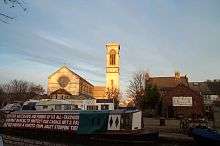St Barnabas Church, Oxford
| St Barnabas Church, Oxford | |
|---|---|
|
View of St Barnabas Church and its campanile. | |
| Location | St Barnabas Street, Jericho, Oxford, Oxfordshire, OX2 6BG |
| Country | England |
| Denomination | Church of England |
| Churchmanship | Traditional Catholic |
| Website | Parish website |
| History | |
| Founder(s) | Thomas Combe and Martha Combe[1] |
| Dedication | St Barnabas |
| Consecrated | 19 October 1869 |
| Architecture | |
| Status | Active |
| Functional status | Parish church |
| Architect(s) | Sir Arthur Blomfield |
| Architectural type | Victorian, Romanesque, Italianate |
| Administration | |
| Parish | Oxford St. Barnabas and St. Paul with St Thomas the Martyr |
| Deanery | Oxford Deanery |
| Archdeaconry | Archdeaconry of Oxford |
| Episcopal area | Oxford Episcopal Area |
| Diocese | Diocese of Oxford |
| Clergy | |
| Vicar(s) | Fr Jonathan Beswick |
| Assistant priest(s) | Fr Andrew Greany |
| Laity | |
| Reader(s) |
Jenny Pittaway Maggie Ellis Prof Sue Gillingham |
| Director of music | Dr Tom Edwards |
| Churchwarden(s) | Henry Gibbon and Hanneke Wilson |
St Barnabas Church is a Church of England parish church in Jericho, central Oxford, England, located close to the Oxford Canal.[2][3]
History
St Barnabas, like many similar churches in the expanding towns and cities of Victorian England, was built to minister to the spiritual and practical needs of the poor and labouring classes. The parish was formed from that of St Paul, Oxford, in 1869; St Paul's was in turn formed from parts of the parishes of St Thomas and St Giles. The church was founded by Thomas Combe (1796–1872), Superintendent of the Oxford University Press close to the church, and his wife Martha (1806–1893), now commemorated by a blue plaque installed by the Oxfordshire Blue Plaques Board.[1] They were supporters of the Oxford Movement (or Tractarian movement). The first Parish Priest was Fr Montague Noel, SSC.
The architect was Sir Arthur Blomfield, a son of the Bishop of London, who had previously designed the chapel for the Radcliffe Infirmary. The architectural style is that of a Romanesque basilica, possibly modelled on that of Torcello, near Venice. St Barnabas has a distinctive square tower, in the form of an Italianate campanile, that is visible from the surrounding area. The church was built on land donated by the local merchant and former Oxford mayor William Ward.[4] It was consecrated in 1869 by Bishop Wilberforce of Oxford and the campanile was completed in 1872. It has a ring of ten, distinctive, tubular bells, and the hours and quarters are sounded on them. St Barnabas features in a wide range of literature, from Thomas Hardy through to P. D. James. The poet John Betjeman wrote a poem about the church.[3][5] A short guide to the building and its story is available from the church, as is the Emma Bridgewater 'Jericho' mug, commissioned specially for St Barnabas.
Present day
The church maintains the Anglo-Catholic tradition of its foundation and is open daily for worship. A parish magazine, Jericho Matters, is produced quarterly and distributed to all of the households and businesses in Jericho. The church hosts many events throughout the year, such as concerts, lectures and exhibitions.
In September 2015 the parish was united with the neighbouring parish of St Thomas the Martyr, to form the new parish of St Barnabas and St Paul, with St Thomas the Martyr, Oxford. St Barnabas is the parish church and St Thomas is the chapel of ease. The first vicar of the new parish is Fr Jonathan Beswick, SSC.[6]
Gallery

 St Barnabas Church from the Oxford Canal in Jericho.
St Barnabas Church from the Oxford Canal in Jericho. View of the campanile from the northwest across the Oxford Canal.
View of the campanile from the northwest across the Oxford Canal.
References
- 1 2 Warr, Elizabeth Jean (2011). The Oxford Plaque Guide. Stroud, Gloucestershire: The History Press. pp. 39–41. ISBN 978-0-7524-5687-4.
- ↑ Hibbert, Christopher, ed. (1988). "St Barnabas, Church of". The Encyclopaedia of Oxford. Macmillan. p. 378–379. ISBN 0-333-39917-X.
- 1 2 "Oxford: St Barnabas, Oxford". The Church of England. 2012. Retrieved 2016-07-11.
- ↑ "William Ward: Mayor of Oxford 1851/2 and 1861/2". Oxford History: Mayors & Lord Mayors. 2012-11-04. Retrieved 2016-07-11.
- ↑ "St Barnabas Church". Jericho Living Heritage Trust. 2009-11-03. Retrieved 2016-07-11.
- ↑ "Contact details". St Barnabas Church.
Further reading
- Bassett, Arthur Tilney (1919) S. Barnabas', Oxford: a record of fifty years. London: A. R. Mowbray
- Sherwood, Jennifer; Pevsner, Nikolaus (1974). Oxfordshire. The Buildings of England. Harmondsworth: Penguin Books. pp. 289–291. ISBN 0-14-071045-0.
External links
| Wikimedia Commons has media related to St Barnabas' Church, Oxford. |
Coordinates: 51°45′28″N 1°16′11″W / 51.757864°N 1.269745°W